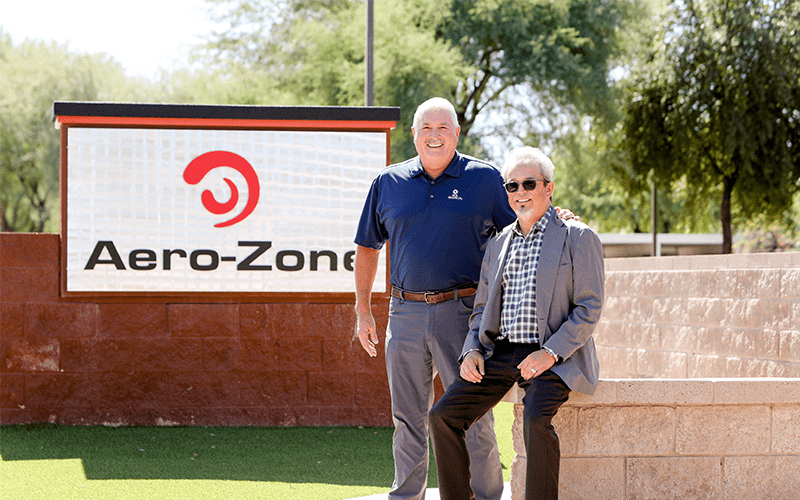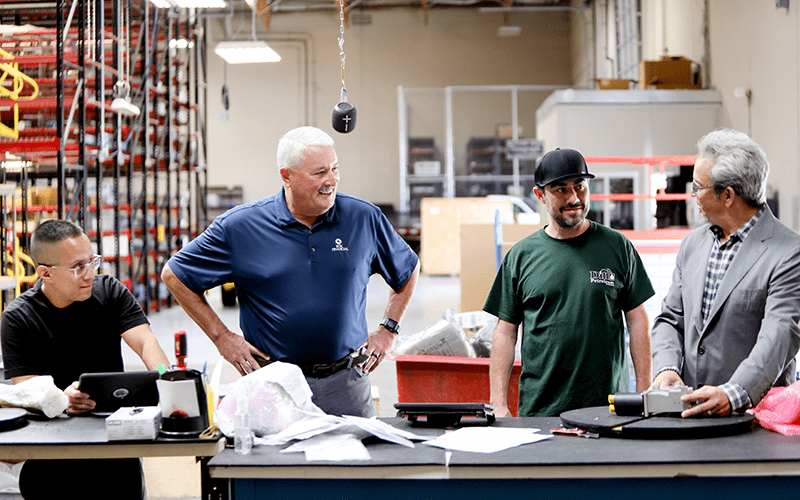Finding their tailwinds
One of Aero-Zone’s biggest challenges today is that inventory keeps flying off its shelves. As challenges go, that’s a pretty good one for the aircraft parts and components provider to have.
“Aerospace has never been stronger in the 30 years that I’ve been doing this,” said Alfredo Dreyfus, president and founder of the Phoenix-area company. “People are traveling like they’ve never traveled before. Being in the commercial airline industry, that means that we’re busy all the time."


Meet Aero-Zone
Founded: 1994
After serving in the Air Force, Alfredo Dreyfus founded Aero-Zone in 1994 in Chandler, Arizona. A California native, Dreyfus had previously been stationed at the former Williams Air Force Base, which is now the Phoenix-Mesa Gateway Airport, and chose that area as the base of operations.
What they do:
Aero-Zone provides airplane parts and components to airlines worldwide, including the major carriers.
Did you know?
The airplane parts that tend to break the most often are anything that passengers or staff members touch, including mundane items such as lavatory fixtures, according to Dreyfus
How Aero-Zone made it's mark:
With an inventory of 6,000 unique items and live 24-hour AOG (aircraft on ground) emergency services, Aero-Zone has the parts that airlines need, when they need them, to get commercial flights off the ground and keep waiting passengers happy. Today, Aero-Zone operates around the globe, with offices in Ireland and Singapore. Plus, there are people representing the company across the U.S.—in New York, the Midwest and, of course, Aero-Zone’s Arizona home base.

Roughly 52% of Aero-Zone’s business is supporting aircraft on ground, called AOG. “It’s similar to what you might consider a 911 emergency for aircraft,” Dreyfus explained. We’ve all been there: you’re sitting onboard a plane waiting for it to take off and suddenly you hear an announcement that the airline is waiting on a part. When airline travel is busy, you’ll hear those announcements more often. Just like a car that’s driven a lot, the more a plane flies, the more often the parts need to be replaced.
Something even as simple as the lighting on a sign not working can ground a plane, or it could be something more significant like an engine or landing gear component.
An inventory-intensive business
Whatever the plane needs, chances are, Aero-Zone has it because of its extensive in-stock inventory. This inventory intensive approach is a smart business move in a field where hundreds of passengers may be delayed from a plane waiting on a single part—but it also requires having enough working capital.
That’s where BOK Financial comes in. For over a decade, BOK Financial has provided Aero-Zone with a line of credit that enables the company to keep their inventory up with demand—however high it soars. “BOK Financial has been an integral part of our growth planning. They are basically part of our team,” Dreyfus said.
It truly is a dual effort: BOK Financial’s financing capabilities, combined with Dreyfus’s proprietary inventory management software, helps Aero-Zone ensure that it’s keeping the parts that aircrafts need most in stock, without getting weighed down by overstocking less-needed components—and turning a profit in the process.
“That’s the beauty of Aero-Zone’s business: they make their money on the ‘buy’—on the purchase of the part, knowing what the resale is going to be,” said Mike Carney, BOK Financial relationship manager. “If they buy a part for a dollar and then sell it for $10, that takes knowledge—and Alfredo’s got it.”
Alfredo has the specialized knowledge to succeed in the niche field of aircraft parts because he’s spent most of his adult life around planes. After growing up in California, he joined the Air Force and was stationed at the former Williams Air Force Base in the Phoenix area. He later decided to make the Phoenix area home to Aero-Zone, which he founded in 1994. Today, the area is home to other companies in the aerospace industry as well, and there is a spirit of cooperation—and, of course, healthy competition—among them, Carney noted.
"BOK Financial has been an integral part of our growth planning. They are basically part of our team.”
Alfredo Dreyfus, President and Founder of Aero-Zone

Spanning the globe
Over the past three decades, Aero-Zone’s business has grown far beyond its Arizona roots—and the nation, for that matter. Today, it has customers and employees worldwide with offices in Ireland and Singapore—an endeavor that was initially challenging from an operations standpoint.
“We pay employees in four different currencies,” Dreyfus noted. “We originally had a bank that we worked with in Ireland and another bank in Singapore. The hoops that we had to jump through as an international organization to keep those relationships and those funds accessible were honestly almost not worth it,” he recalled.
Fortunately, BOK Financial was able to help streamline Aero-Zone’s international banking needs by enabling the aerospace company to bank in different monetary units all through one financial services company. Meanwhile, BOK Financial’s foreign exchange team helps Aero-Zone make the most out of currency markets, answering questions such as whether it’s better to do a wire transfer in U.S. dollars or euros, Carney noted.
BOK Financial was also able to use the international nature of Aero-Zone’s business to respond to the company’s needs for more working capital. “A few years ago, we were trying to push our line of credit up and a lot of the receivables and the inventory we had overseas weren’t being considered towards the collateralization,” Dreyfus said.

Fortunately, the BOK Financial team knew Aero-Zone and its international track record well enough that they recognized that Aero-Zone’s Ireland-based inventory and receivables should be part of the conversation. “We went down that route and were able to push our credit line by several million dollars because of the open mindedness, logic and common sense behind the decision-making powers that be at BOK Financial,” he explained.
For Carney, having the freedom and breadth of services to respond to Aero-Zone’s needs helps him go above and beyond for them and other clients.
In Aero-Zone’s case, BOK Financial has helped with everything from common business needs such as treasury management to more personal needs such as Dreyfus’s estate planning. “From top to bottom, BOK Financial’s team is always accessible and relatable,” he said. “I feel like I’m talking to a peer.”
"When we need to, we can go outside the box. We have the leeway to get creative. We can bring clients in, give them good service and by knowing their business and industry, we can help them understand other areas of their business we can support."
Mike Carney, BOK Financial relationship manager
Three questions to consider before you expand your business internationally
Expanding your business internationally can be exciting—but also daunting. Here’s some of what you need to consider.
Where do you want to locate your other operations and why?
When Aero-Zone chose Shannon, Ire., Dreyfus considered factors including the ease of travel between there and the U.S., the skilled workforce, government regulations, the existing aerospace industry and the proximity to continental Europe. Weighing these and other factors into your decision early can save you a headache down the road when dealing with regulatory red tape, difficult travel or a lack of a skilled workforce.
How will you pay your overseas employees?
Aero-Zone’s international operations means that they have to pay employees in four different currencies, which can itself be daunting. Originally, Aero-Zone tried working with banks in Ireland and Singapore in addition to the U.S., but that led to “too many hoops” to jump through, Dreyfus said. Instead, working with one financial services company—BOK Financial—made it easier to access funds internationally and maintain a good banking relationship. Plus, BOK Financial now enables them to bank in these different currencies all through one financial services provider and make the best out of currency market fluctuations.
If you have a working line of credit, will your loan provider be willing to consider your non-U.S. accounts and receivables as collateral?
Some may not be willing to do so because of the international auditing it requires, Carney noted. Finding a loan provider that will collateralize non-U.S. accounts can make a huge difference in your business’s access to credit; in Aero-Zone’s case, it enabled them to boost their credit line by several million dollars.
More success stories
-
Continuing its mission
A line of credit helped the nonprofit arc Thrift Store expand while continuing to enhance the lives of people with disabilities.
-
A partnership built to last
Discover how a revolving line of credit supported MTech for 20+ years of transforming Colorado’s cityscape.
-
Enter sandman
Asset-based lending provided working capital to help this young company sustainably scale up.



